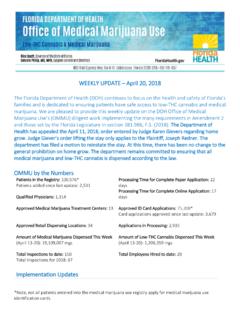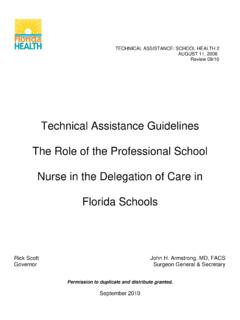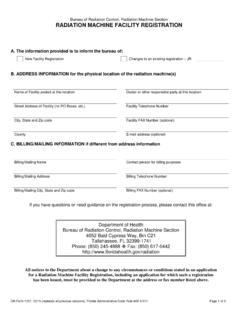Transcription of FLORIDA'S OMNIBUS AIDS ACT - Florida Department of …
1 FLORIDA'S OMNIBUS aids ACT: A BRIEF LEGAL GUIDE. FOR. health CARE PROFESSIONALS. Originated by JACK P. HARTOG, Esq. Gray Robinson, Attorneys at Law August 2013. Florida Department of health Division of Disease Control and health Protection Bureau of Communicable Diseases HIV/ aids and Hepatitis Section TABLE OF CONTENTS. PAGE. 4. Introduction .. 5. I. overview .. 6. II. Performing HIV 10. A. Informed Consent . 11. 1. information Requirements 2. Minors 3. Documenting Informed Consent 4. Exceptions to Informed Consent Requirements 5. Consequences of Testing Without Informed Consent B. Preliminary and Confirmatory Tests.
2 20. C. Notification 23. 1. Confirming the Test Subject's Identity 2. Post-Test Counseling information 3. All Reasonable Efforts . 4. Model Protocols for Counseling and Testing III. Confidentiality .. 27. A. "HIV Test Results" .. 27. B. Special Handling Requirements .. 29. 1. Legally Effective Releases 2. Court Orders 3. Warning Statements 4. "Need to Know" Limitations 5. Exception for Hospitals C. Permitted 35. 1. PAGE. D. Consequences of Breaching 39. IV. Notification of Third Parties .. 40. A. No Duty To Warn .. 40. B. Voluntary Partner Notification .. 41. C. Privilege to Warn .. 42. V. Public health 44.
3 A. HIV Infection 44. B. Involuntary Measures .. 46. C. Testing Services .. 47. VI. Significant Exposures .. 48. A. "Need to Know".. 48. B. Testing Available Blood Without 49. Conclusion .. 51. 2. ACKNOWLEDGMENT. Jack P. Hartog, the author who originated and revised this pamphlet, is a health care attorney with Gray Robinson, a large Florida law firm that, among its broad array of services, specializes in health care law. He received his law degree from Stanford University after completing his undergraduate education at Cornell University. Before joining Gray Robinson in 2008, Mr. Hartog served as an Assistant County Attorney for Miami-Dade County, Florida , for more than 21 years as counsel for the Public health Trust of Miami-Dade County.
4 The Trust governs and operates the Jackson health System, including Jackson Memorial Hospital ( FLORIDA'S largest and busiest hospital) and the South Florida aids Network. Since the enactment of FLORIDA'S OMNIBUS aids Act in 1988, Mr. Hartog has conferred extensively with legislators and staff of the Department of health (formerly the Department of health and Rehabilitative Services) regarding amendments to and implementation of the OMNIBUS aids Act. He has lectured throughout Florida to hospital staff, physicians, osteopaths, dentists, nurses, social workers, mental health professionals, medical records custodians, risk managers and lawyers about FLORIDA'S HIV laws and other health care matters.
5 The Florida Department of health expresses its gratitude to Mr. Hartog as author of this informative and important publication. While Mr. Hartog drafted the original and all versions through 2009 of this pamphlet under contract, the Department takes full responsibility for and ownership of its contents. 3. INTRODUCTION. This pamphlet was first issued in 1990 after the Florida Legislature amended its 1988. comprehensive legislation, commonly referred to as the " OMNIBUS aids Act" (now codified principally at , ). This law addresses the many ways human immunodeficiency virus (HIV) and acquired immune deficiency syndrome ( aids ) affect the public health and welfare, comprehensively creating numerous programs and establishing various requirements for state agencies and health care providers.
6 The OMNIBUS aids Act (referred to in this booklet simply as the Act ) and its related laws directly affect doctors, nurses, health care administrators and other front-line health care providers. This booklet summarizes these laws for health care providers. It contains a detailed table of contents to facilitate the identification and resolution of issues that may arise. This updated edition includes all significant changes in this law since 1988 as they affect health care providers. The information in this booklet is not intended to be a substitute for legal advice from an attorney. In the interest of clarity and brevity, some general rules have been simplified and some exceptions and qualifications have been omitted.
7 In addition, factual details surrounding a particular health care delivery problem or complaint can easily change not only which rule applies but also how it applies and whether it is workable. Finally, the legal citations that are included are not intended to be complete, but only to serve as guides to the most essential information . Before acting on the material in this booklet, health care providers are strongly urged to consult with a lawyer or risk manager. 4. I. overview . In 1988, through the OMNIBUS aids Act, Florida became one of the first states with high rates of HIV infection to enact comprehensive legislation addressing the aids epidemic.
8 In 20132, the Act, although amended several times, remains largely consistent with the recommendations of many national organizations, including the Centers for Disease Control and Prevention (CDC) of the Department of health and Human Services that have carefully examined the issues. The Act is premised on the health policy judgment that this illness can best be controlled through an informed public that knows how to avoid contracting and transmitting the disease and that voluntarily agrees to be tested. (2), The rationale for this approach is straightforward. It is based upon the limited methods by which this relatively weak virus can be transmitted.
9 Transmission occurs through direct contact of virus-containing body fluids with exposed membranes as in sexual activity; or introduction into the blood stream through transfusion or needle sharing, as in intravenous drug use; or from infected mother to fetus or nursing infant. These activities usually involve private, consensual conduct. Government cannot easily, much less constitutionally, regulate or prevent such activity. Consequently, short of wholesale invasions of civil liberties and fundamental rights to privacy, governmental responses must rely primarily upon education of the public and its cooperation with health care recommendations.
10 The OMNIBUS aids Act advances its public health objectives principally through education of health care providers and Florida residents. To keep or get a license to practice in Florida , most licensed health care providers must take a course on HIV/ aids . tailored to the profession, and every licensed health care facility must educate its entire work force about HIV infection. and , The Act also mandated similar education for various institutionalized patients, school children, university and college students and law enforcement and correctional officers, much of which has been folded into continuing disease prevention efforts, , , , and , In 1999, the legislature directed the Department of health to develop and implement a statewide HIV and aids prevention campaign to strengthen 5.













